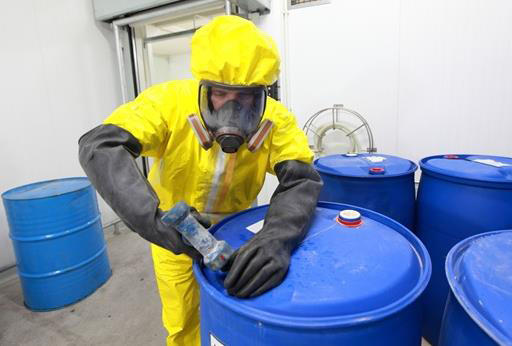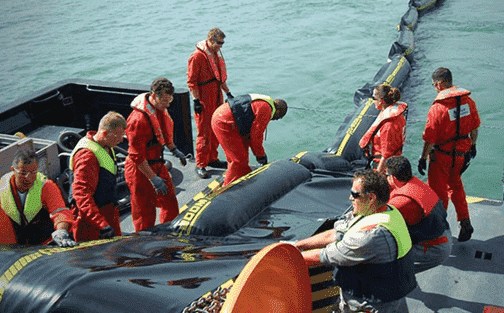COURSE OVERVIEW
HE0128 : Industrial Hygiene Certification Program: OHTA505: Control of Hazardous Substances (Accredited by OHTA)

OVERVIEW
| COURSE TITLE | : | HE0128 : Industrial Hygiene Certification Program: OHTA505: Control of Hazardous Substances (Accredited by OHTA) |
| COURSE DATE | : | Sep 08 - Sep 12 2024 |
| DURATION | : | 5 Days |
| INSTRUCTOR | : | Mr. Peter Jacobs |
| VENUE | : | Al Khobar, KSA |
| COURSE FEE | : | $ 7500 |
| Request For Course | ||
OTHER SCHEDULED DATES
| Date | : | Jun 02 - Jun 06 2024 (5 Days) | Location | : | Doha, Qatar | Classroom Fee (US$) | : | $ 8000 | Course Info |
| Date | : | Nov 16 - Nov 20 2024 (5 Days) | Location | : | Dubai, UAE | Classroom Fee (US$) | : | $ 7500 | Course Info |
| Date | : | Apr 06 - Apr 10 2025 (5 Days) | Location | : | Dubai, UAE | Classroom Fee (US$) | : | $ 7500 | Course Info |
| Date | : | Jun 16 - Jun 20 2025 (5 Days) | Location | : | Abu Dhabi, UAE | Classroom Fee (US$) | : | $ 7500 | Course Info |
| Date | : | Sep 07 - Sep 11 2025 (5 Days) | Location | : | Al Khobar, KSA | Classroom Fee (US$) | : | $ 7500 | Course Info |
| Date | : | Nov 02 - Nov 06 2025 (5 Days) | Location | : | Doha, Qatar | Classroom Fee (US$) | : | $ 8000 | Course Info |
Course Description
This practical and highly-interactive course includes various practical sessions and exercises. Theory learnt will be applied using our state-of-the-art simulators. This course is to describe the ways in which exposure to hazardous substances arises in the workplace and to introduce the methodologies and technologies available to control exposures and thereby reduce risks to health. On completing this course successfully, participants will be able to :- 1) Describe how airborne contaminants are generated by industrial processes, how this impacts on the control strategy, and how control solutions can thereby be optimised. 2)Recognise the range of approaches to risk reduction embodied in the hierarchy of control and select appropriate strategies for implementation. 3)Describe the meaning of ?adequate control?, particularly in relation to personal exposures. 4) Discuss the importance of design considerations in terms of the workplace, process, and plant, as a means of reducing occupational exposures. 5)Describe the principal elements of a local exhaust ventilation system, give examples of typical installations and know how to carry out the necessary measurements to assess whether a local exhaust ventilation system is effective and operating to the design specification. 6)Recognise the limitation s of local exhaust hoods and enclosures and the means to optimise their effectiveness. 7)Describe how personal protective equipment programmes may be used in an effective manner. 8)Recognise the impact that control measures may have on other workplace hazards and understand the need to take a holistic approach to the design of control solutions. During this interactive course, participants will learn the administrative elements comprising of reducing periods of exposure, exclusion of non-essential personnel, personal hygiene arrangements, coordinated approach to control, training and supervision; the access to hazardous areas and the role of assessment measurement, monitoring, health surveillance in initiating control measures; the role of written operating procedures, permits to work; and the role of occupational hygiene programmes in continuing control.
TRAINING METHODOLOGY
This interactive training course includes the following training methodologies:
LecturesWorkshops & Work Presentations
Case Studies & Practical Exercises
Videos, Software & Simulators
In an unlikely event, the course instructor may modify the above training methodology for technical reasons.
VIRTUAL TRAINING (IF APPLICABLE)
If this course is delivered online as a Virtual Training, the following limitations will be applicable:
| Certificates | : | Only soft copy certificates will be issued |
| Training Materials | : | Only soft copy materials will be issued |
| Training Methodology | : | 80% theory, 20% practical |
| Training Program | : | 4 hours per day, from 09:30 to 13:30 |
RELATED COURSES

HE0851 : Certified Incident Investigator: Incident Investigation & Reporting (NFPA, OSHA, API, ISO & ANSI Standards)
- Date: Jan 05 - Jan 09 / 3 Days
- Location: Dubai, UAE
- Course Details Register

HE0400 : Fundamentals of Process Safety & Loss Prevention
- Date: Jan 05 - Jan 09 / 3 Days
- Location: Doha, Qatar
- Course Details Register

HE0790 : Oil Spill Management & Response (IMO Certification)
- Date: Jan 05 - Jan 09 / 3 Days
- Location: Al Khobar, KSA
- Course Details Register

HE0749 : API-780: Security Risk Assessment Methodology for the Petroleum & Petrochemical Industries
- Date: Jan 05 - Jan 09 / 3 Days
- Location: Dubai, UAE
- Course Details Register
